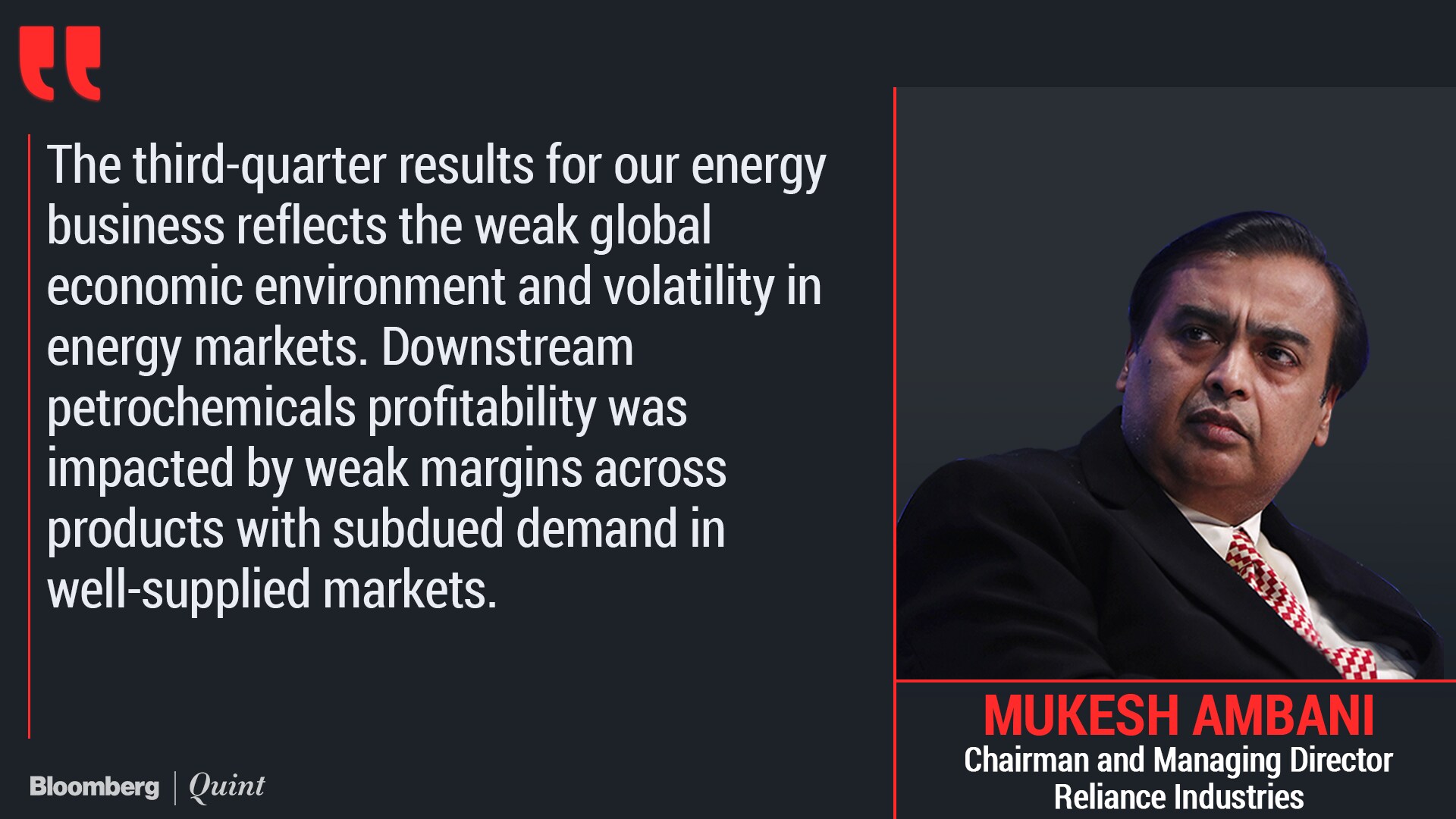
Reliance Industries Ltd.'s standalone quarterly profit met estimates even as refining margin fell unexpectedly and its petrochemicals business declined.
Net profit fell 1.2 percent sequentially to Rs 9,585 crore in the quarter ended December, according to an exchange filing of the billionaire Mukesh Ambani group's flagship company. Analyst estimates compiled by BloombergQuint had pegged earnings at Rs 9,706 crore.
- Revenue fell 1 percent to Rs 86,289 crore. That compares with the Rs 92,803-crore estimate.
- Operating profit fell 5.8 percent to Rs 12,871 crore, against the estimated Rs 14,608 crore.
- Operating margin narrowed 80 basis points to 14.9 percent.
WATCH | 5 key takeaways from RIL's Q3 earnings.
The oil-to-telecom conglomerate faced pressure in its legacy refining and petrochemicals businesses due to a global supply glut, leaving the newer telecom and retail units to offset that impact. While that plays into billionaire Mukesh Ambani's long-term plan of having his consumer business contribute half of RIL's revenue, it does not bode well in the short term where refining and petrochemicals still make up almost 60 percent of its operating income.
RIL's gross refining margin—what a company earns for converting one barrel of crude into fuel—fell to $9.2 per barrel from $9.4 in the preceding quarter. Analyst estimates had pegged GRM at $9.5 a barrel. Still, that's at a premium of $7.5 per barrel to the Singapore gross refining margin—the highest in at least 11 years.
The Asian benchmark of profitability for crude refiners tumbled 74 percent sequentially in the quarter gone by to average at $1.7 per barrel in the three months ended December, the lowest in at least eight years. That's because of a fall in margin of fuel oil as ships across the world opted for a cleaner alternative, as well as other products like diesel amid a slowing economy and excess global supply.
But that didn't affect RIL to that extent because India's most valued company doesn't produce fuel oil—a residue of petrol, diesel and jet fuel. Despite lower refining margin, the refining segment's earnings before interest and tax rose to an eight-quarter high of Rs 5,614 crore.

RIL's petrochemical segment, however, reported its biggest decline in EBIT in at least four years on a fall in product spreads—the difference between raw material costs and selling price. The segment's EBIT fell 22.8 percent over the preceding quarter to Rs 5,788 crore in the third quarter.
And there are no signs of things improving on this front either, according to Gurmeet Chadha, chief executive officer and co-founder of Complete Circle Consultants. “I don't see it improving. There is a supply glut across,” he told BloombergQuint. “There was some hope that lower feedstock prices and high volumes could offset the softness. But that was not seen.”
The consumer business—Reliance Jio and Reliance Retail—will have to do the heavy-lifting.Gurmeet Chadha, Co-Founder & CEO, Complete Circle Consultants
Ambani's telecom unit, Reliance Jio Infocomm Ltd., saw a 36 percent sequential rise in quarterly profit on a rise in average revenue per user. However, its operational results were lower than analysts' estimates.
Other Highlights
- Consolidated debt rose further to Rs 3.06 lakh crore from Rs 2.91 lakh crore in the previous quarter.
- Consolidated finance cost remained largely flat at Rs 5,404 crore.
- Capital expenditure declined to Rs 14,015 crore from Rs 19,095 crore.
- Saudi Aramco deal will not be completed by March 31.
Shares of Reliance Industries Ltd. rose 2.8 percent ahead of the results announcement compared with a flat Nifty 50 Index.
Essential Business Intelligence, Continuous LIVE TV, Sharp Market Insights, Practical Personal Finance Advice and Latest Stories — On NDTV Profit.























